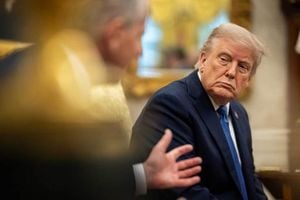As the political landscape shifts in Germany, the Social Democratic Party (SPD) is gearing up to unveil its new cabinet under the leadership of incoming Chancellor Friedrich Merz. The SPD is set to announce its ministerial appointments on May 5, 2025, with party chief Lars Klingbeil taking the significant role of Finance Minister and Vice-Chancellor.
After a tumultuous period marked by the SPD's disappointing performance in the last federal elections, Klingbeil is promising a fresh start with a "strong and competent" team. He emphasized the need for a generational change, stating that the SPD would focus on both experience and new faces to reinvigorate its image and effectiveness within the government.
One notable change is the anticipated departure of Hubertus Heil, the current Federal Minister of Labor, who has confirmed his exit from the cabinet. "I was happy to be the Minister of Labor, and I will continue in the SPD parliamentary group as a member of parliament," Heil said, reflecting on his tenure with gratitude. His departure opens the door for Bärbel Bas, the former President of the Bundestag, who is expected to take over the Labor Ministry. Bas has been a prominent figure in the SPD, successfully winning her constituency in Duisburg since 2009.
In addition to Bas, the SPD is also expected to nominate Carsten Schneider as the Minister for Environment and Climate Protection. Schneider, who previously served as the East Commissioner of the federal government, is poised to oversee significant funding allocations in this crucial area.
Other candidates for ministerial positions include Reem Alabali-Radovan, who is likely to head the Ministry for Economic Cooperation and Development, and Stefanie Hubig, who is anticipated to take on the role of Justice Minister. Verena Hubertz is also a strong contender for the Ministry of Housing, Urban Development, and Construction, having made a name for herself as a rising star in the party since her election to the Bundestag in 2021.
As the SPD prepares to finalize its cabinet, the party is also grappling with internal dynamics. While some members support the new leadership direction, others express concerns about the balance of power within the party. Klingbeil's strategy appears to aim at unifying these factions, as he aims to present a cohesive front in the upcoming coalition with the CDU and CSU.
Boris Pistorius is the only SPD minister expected to retain his position as Minister of Defense, a role he has held with considerable popularity. His continued leadership is seen as crucial, particularly as Germany navigates complex defense challenges in the current geopolitical climate.
The SPD's cabinet composition will feature a notable gender balance, with six women and three men nominated for the nine positions, reflecting a commitment to diversity and representation. Four of the women are under 40, signaling a shift towards younger leadership in the party.
As the SPD prepares for its public announcement, the coalition agreement with the CDU and CSU is also set to be signed around noon on May 5, 2025. This marks a significant step in re-establishing a government that had previously been dubbed the "grand coalition" due to its substantial majority in the Bundestag.
The incoming Chancellor Friedrich Merz faces a critical test as he seeks to secure the support of at least 316 votes in a secret ballot scheduled for May 6, 2025, to officially assume his role. With the Bundestag comprising 328 members from the Union and SPD, the stakes are high for Merz as he navigates the intricacies of coalition politics.
As Germany embarks on this new chapter, the SPD's cabinet appointments will be closely scrutinized not only for their immediate impact on governance but also for the long-term implications for the party's future and its relationship with the electorate.
In conclusion, the SPD's strategic cabinet selections reflect a blend of continuity and change, aiming to harness both seasoned political experience and fresh perspectives. As the government takes shape, all eyes will be on how these new appointments will influence policy directions and the overall effectiveness of the coalition in addressing the pressing challenges facing Germany today.




